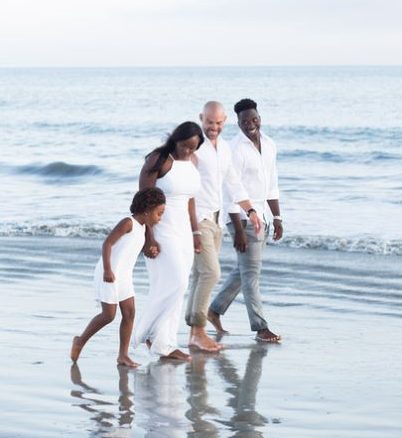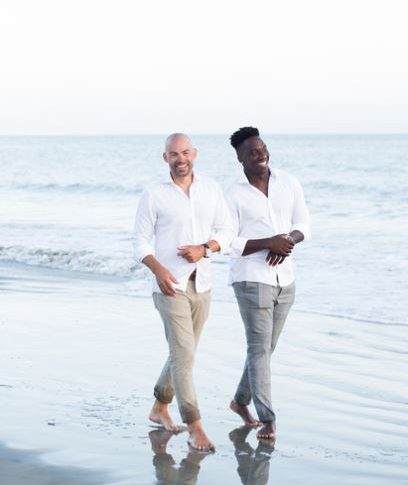
“We need to start the conversation of racial inequality early at home and then continue it all through school. Education is one of the solutions for ignorance and to change perceptions,” says Doreen Genmark, who comes to this issue with a unique perspective having been born in Uganda, moving to London at three weeks old, and living there with her family for four years. She spent her formative years in Sweden before coming to the United States with her husband and two children seven years ago.
Her husband Krister Genmark says, “I don’t see color, but know that I will never experience things the same way Doreen and my kids do because I am a white man. My grandparents, on the other hand, were from a more prejudiced generation, and asked what our kids would look like when Doreen and I got together.” Krister adds that he knows it’s not enough that he doesn’t see color, because society does, so he has to put himself in a different pair of shoes.
“As a family, we stress that we are all created equal and that it is important to respect the police because they are here to protect and serve,” he comments. When young, both Doreen and Krister aspired to be police officers but ended up on different paths with Doreen starting re:deefined, a marketing and branding agency. Krister, former Swedish military, works as the Head of Operations for Web Manuals, a software company in the aviation industry.
“Racism is more hidden in Sweden,” says Doreen. In Sweden, she and her three brothers experienced it among the vast number of immigrants in the less privileged neighborhood in which they grew up. Her mom always stressed the importance of education and moved them to a better community to give them a better chance at life. Doreen has felt the sting of racism throughout her life being called names and passed over for jobs. She doesn’t want to instill worry in her children, but she has felt that she has had to prepare them.

They had “the talk” with their son Jordan when he started driving at 16, and it scared him when he was pulled over, although the officer was peaceful. The other day when walking in an alley here, father and son were stopped by the police to see if they had seen a disturbance; it didn’t seem like a big deal to dad, but Jordan was affected by it. “We couldn’t help to think of what the conversation would have been like if Jordan had been on his own,” says Doreen. Both Krister and Doreen emphasize that it’s important not to portray the police as evil, but to recognize that some have a cultural problem that the system needs to root out. “We need to hold the police accountable, and give them more training and demilitarize the system,” points out Krister.
They have lived in the U.S. for seven years, with three of those spent in Coronado. They discovered Coronado when they stayed at a friend’s house, and they have grown to love it and made many great friends. Doreen admits that she was reluctant to move to the San Diego area because of the lack of diversity. Krister always had a dream to move to the U.S. and remembers having an American flag in his room as early as age five. “There is the image that America is a melting pot, but it comes with obvious but unspoken segregation,” says Doreen. People have asked them why they have chosen to raise their kids in predominately white Coronado, and they answer that they want the right to live where they choose.

Some positive experiences from their children include the day when Ciara was feeling down about the color of her brown skin and different hair after an incident that happened at school. A young white male passing by pointed out that she had the best of both worlds and that he had to go out in the sun to get pretty skin like she had and knew his hair would never have that much volume, no matter how hard he tried. One day, a school friend said, “You are so lucky you are unique. I look like everyone else.”
“People walk up to Jordan, assuming he must be an athlete at Notre Dame, asking what sport he does rather than first asking what he’s studying.” Doreen continues. He always answers that he is first-most a student. And yes, he is a football player, but it’s important not to stereotype people no matter who you are. Doreen has also had to teach her daughter that’s ok to say no to people wanting to touch her hair.
“Things feel different this time. Our whole block rallied and protested with signs. They told us, ‘We support you because you are our people, and we need to be part of the change,'” she says. “It’s hard to lead this charge on our own; it makes a huge difference with more people getting involved and especially ones that don’t share our color.” They were surprised and pleased to have three schoolboys bring water for the protesters on Orange Avenue. Kindness goes a long way in uniting people. They acknowledge that incorrect stereotypes can go both ways. During the peaceful protest, they saw people that they were sure wouldn’t be supportive and discovered that they were.
People don’t always realize how racial slurs affect people, but when they explain it, they are often sorry and don’t understand the consequences of their actions. Doreen has discovered that when people are curious about her customs, food, hair, and other things, she welcomes it, and finds that they appreciate the explanation. She had an unusual experience with a little boy at Spreckels Park who asked to touch her hand and then quickly licked it. He wondered why she didn’t taste like chocolate as his mother had told him.
Doreen says it’s important to have conversations, but that it’s always tiring to have to be the one initiating. She feels that many people are not racist but rather just ignorant. Krister says it’s time to actively change this, and getting everyone, despite color, involved is the only way forward; otherwise, this same conversation will be taking place ten years from now. The couple acknowledges that it’s hard to change perceptions, but that’s what needs to happen with discussions and actions in schools, and at the legislative and government levels to establish real change. Krister emphasizes, “We need to stop being uncomfortable talking about racial injustice and diversification. When we don’t say something, it’s silent agreement.”
They highlight that kids are not born with biases; those are taught. What kids learn from their parents resonates throughout life. They advocate that we need the conversation to happen at every dinner table. We can’t accept people being treated differently because of the color of their skin any longer. Even though they wish Coronado were more diverse, they point to the military for helping bring diversity here.
Doreen is adamant that Coronado schools need to step it up. She and several other mothers of black and brown children have offered solutions, volunteering to share their perspectives, and work with the school library to exclude inappropriate books and include needed ones. “I want my children to walk on campus, and together with all kids learn and read about different cultures and feel included.”

Such a fun and loving family, Doreen, Krister, Jordan, and Ciara, agree, “Let’s make a difference – together.”




